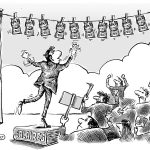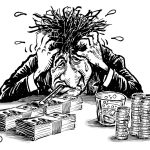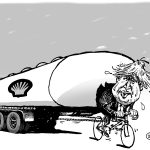Crowning China
The CCP’s 100th anniversary marks a new step for China’s leader on the way to global political and economic leadership
What could be a greater symbol than to see President Xi Jinping celebrating the 100th anniversary of the founding of the Chinese Communist Party in Mao costume? Dominating the parades and celebrations, the Chinese President thus gave to see how much his country had succeeded in the synthesis of the “socialist market economy”. Implemented by Deng Xiao Ping and continued for ten years by his successors, the country’s “four great reforms” have delivered undeniable successes, bringing the Middle Kingdom to the rank of the second largest economy in the world in record time. Firmly rejecting the “fifth reform” – that of political liberalization – its leaders have maintained the helm of a political and military organization that President Xi Jinping has further strengthened since coming to power in 2012. To serve his global ambition, he began by consolidating his power as never before since Mao Zedong. Thus, he had the limit of two terms of 5 years removed, he took the head of the army (cumulating all mandates) and had his thoughts inscribed in the Constitution of the People’s Republic as well as in the Charter of the Party.
Far from reducing the role of the Communist Party, Xi Jingping has made it the central cog and the striking force of a policy of increased control of the population (through the establishment of social credit) and economic policy (through the direct presence of its members in corporations), not without resorting to brutal purges among its cadres. The financial crisis and the American and global recession of 2008, was a revelation to the man who was to take the reins of the country 4 years later, as he could measure the weaknesses of the liberal capitalist system and elaborate his “dream” to restore China to its rank as the world’s leading power, according to his own model, and finally free herself from the western colonial economic and financial power, which ruined and dismembered his country two centuries ago.
Revelations about the conditions of oppression of Uyghur minorities have contributed to tarnishing the country’s image at the international level and have sparked protests.
And this ambition has manifested itself on many levels: after physical infrastructures, it is the advances in the technological race, the organization of financial markets and the implementation of a CIPS system of interbank payment, the investment in blockchain and e-RMB, that hold all the attention of managers. On the international front, the “New Silk Roads” carry the country’s economic ambitions, while satisfying the needs of securing its supplies and outlet of its production. The massive effort to catch up also relates to the equipment and modernisation of the army, a force for maintaining internal order and external projection, in the service of an initial objective of ‘reunification’ of the country (aimed, as we will have understood, at the ‘return’ of Taiwan to the national fold).
In so doing, China has aroused fear, mistrust and even growing hostility towards it: a member of the WTO since 2001, it has, however, been denied the status of market economy. Its business methods are increasingly openly contested. The Covid-19 pandemic crisis has only reinforced these perceptions. The lack of transparency in the initial management of the crisis; a diplomacy sometimes made up of more or less self-serving cooperation (diplomacy of surgical masks and then vaccines), of pressures (aid conditional on support or other commercial agreements), but also of more frank aggressions (commercial retaliatory measures against Australia, expulsions of foreign journalists); vaccine results questioned by some recipient countries (Chile, Indonesia); revelations about the conditions of oppression of Uyghur minorities have contributed to tarnishing the country’s image at the international level and have sparked protests.
The pandemic has revealed the lack of social security coverage that is still lacking.
China, for its part, still faces major challenges: its model of industrial development is struggling to transform itself into a model of consumption and productive development. While consumption accounts for less than 40% of GDP, the country remains classified as a middle-income economy by the World Bank, due to a GDP per capita estimated at between 10,000 and 15,000 dollars and glaring social inequalities. The pandemic has revealed the lack of social security coverage that is still lacking. China, whose single-child population is aging rapidly, is struggling with the gradual slowdown in its growth and the growing willingness of many countries to re-establish value chains at the expense of its exports.
Adhering to the climate and fiscal commitments recently made at the OCDE and soon G20 level, the central government intends to strengthen its ecological investment policy, but is encountering local reluctance from the mining provinces. The political control of Hong Kong with the introduction of the National Security Law, the threats to Taiwan, the “incidents” in the China Sea and on the land borders (with India), put its neighbors a little more on their guard. So, what are the weight of the trade agreements signed at the end of last year with ASEAN, Korea, Japan, New Zealand and Australia? The US desire to contain China’s economic and strategic expansionism more frontally, while constituting a “front of democracies”, threatens to limit the country’s external scope for action. Could the European Union intervene a little more between the two great rival powers and allow President Xi to agree to return to a level playing field? The investment agreement signed at the end of 2020 would be the signal, but it finds little support in the face of fears aroused by the authoritarian excesses of the Chinese regime. However necessary it may be, cooperation with China cannot be built only on the terms it wishes to impose.
Having donned the costume of the Great Helmsman, will Xi Jinping be able to stay away from the excesses of his predecessor?
Original french version article in allnews.ch Dated July 6, 2021 Cartoon © Barret



